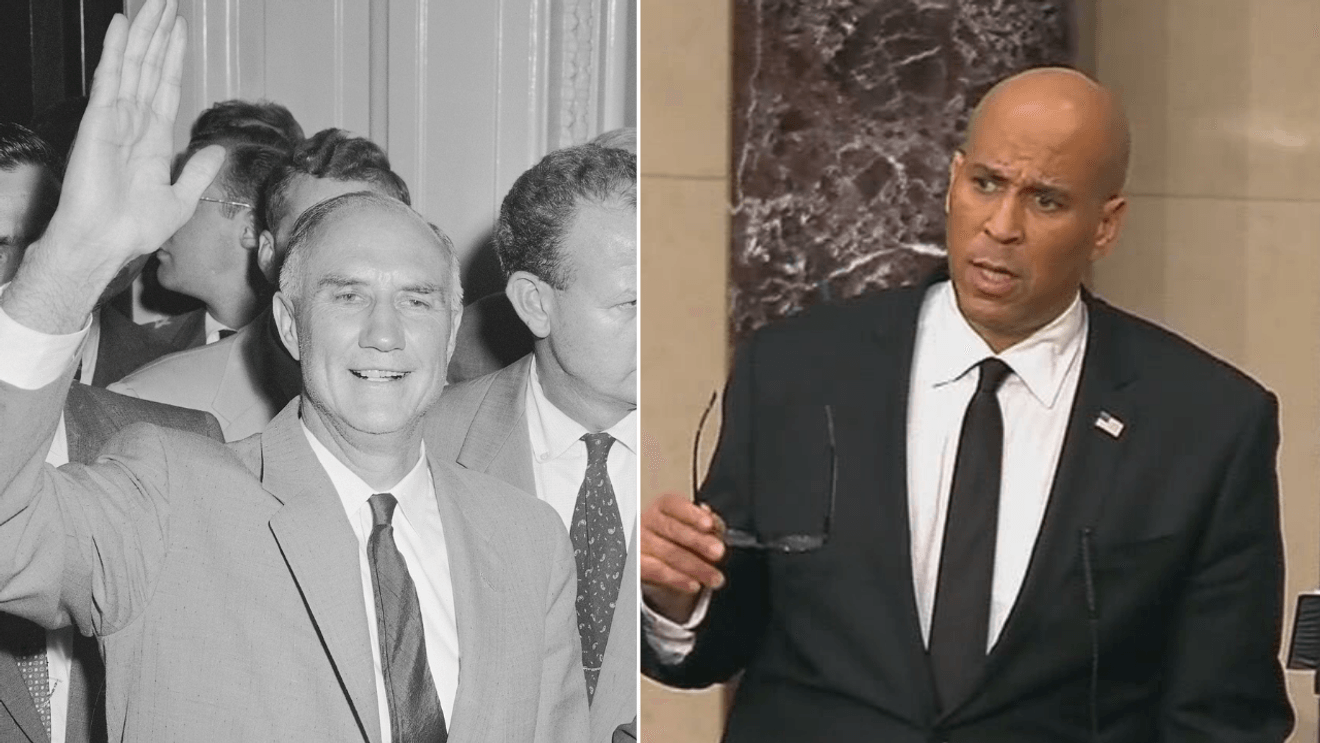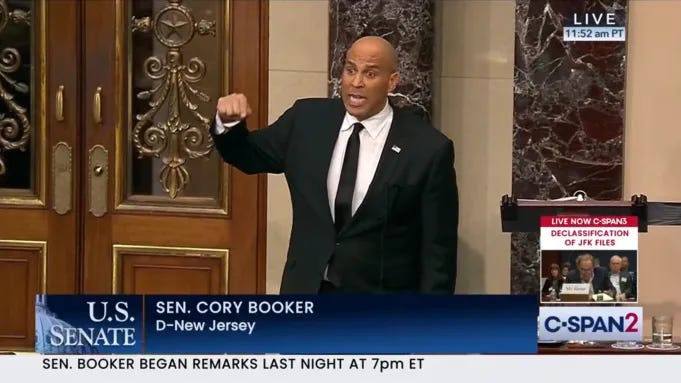Marathon of Conviction: Analyzing Cory Booker’s History-Making Senate Speech
How the New Jersey Senator’s 25-Hour Marathon on the Senate Floor Turned Political Passion into History
Senator Cory Booker (D-NJ) spoke on the Senate floor for over 25 hours in a marathon address that concluded this evening, shattering a decades-old record for the longest continuous Senate speech. By holding the floor overnight and through the day, Booker surpassed the 24-hour, 18-minute solo speaking record set in 1957 by the late Sen. Strom Thurmond – a South Carolina segregationist who had infamously filibustered against the Civil Rights Act. Booker's feat marks the second time in U.S. Senate history that a lawmaker has sustained remarks for over a full day, drawing astonishment across Washington. More importantly, it has flipped the historical script: a Black senator now holds the endurance record once used to oppose civil rights, a symbolism not lost on Booker's colleagues. "It's an incredibly powerful moment," said House Democratic Leader Hakeem Jeffries, noting that Booker broke "the record of a segregationist" while "fighting to preserve the American way of life and our democracy."
A 25-Hour+ Marathon on the Senate Floor
Booker began his speech at roughly 7:00 p.m. ET Monday and refused to yield the floor until he physically could no longer continue. In doing so, the 55-year-old former Newark mayor demonstrated remarkable stamina and discipline. He stood the entire time, never leaving the small space by the podium. He did not eat, subsisting only on occasional sips from two glasses of water that aides refilled as needed. At times, he leaned on the podium for support or mopped his brow with a handkerchief, but he notably never loosened his suit and tie even as the hours wore on. Senate rules required him to stay on his feet and keep speaking "more or less continuously" throughout – he could not sit or depart without forfeiting the floor. In a savvy move to avoid any lapse, Booker even had a page remove his chair from the chamber to eliminate any temptation to sit down, according to Sen. Chris Murphy. Each time a Democratic colleague rose to help by interjecting a lengthy question – the only permissible respite – Booker dutifully recited the ritual phrase "I will yield for a question while retaining the floor," ensuring he never accidentally gave up his marathon effort. He remained upright beside his desk even as others spoke, catching brief moments of relief but never leaving the spotlight.
As Monday turned to Tuesday, the ordinarily hushed Senate chamber became a stage for an extraordinary test of endurance. Booker's voice occasionally grew hoarse through the predawn hours and into daylight, then swelled with emotion as he pressed into the afternoon. By Tuesday evening, as word spread that history was in the making, the public galleries above the Senate floor filled with staffers and onlookers eager to witness the moment Booker would break Thurmond's 68-year record. Several House members – including the Congressional Black Caucus and Minority Leader Jeffries – quietly slipped in to watch from the back of the chamber. Many of Booker's fellow senators from his party were on the floor throughout the marathon, ready with encouragement and procedural questions to sustain him. More than two dozen Democratic senators participated, engaging Booker in colloquies on various policy issues to highlight their causes and give him brief breaks. Notably at Booker's side was Sen. Chris Murphy (D-Conn.), who stayed with him much of the night – repaying a favor from 2016, when Booker had stood by Murphy during Murphy's 15-hour filibuster on gun violence.
Shortly after 7:19 p.m. ET Tuesday, Cory Booker crossed the 24-hour-19-minute mark, officially making his speech the longest in Senate history. At that moment, as the exhausted but determined Senator kept talking, Senate Minority Leader Chuck Schumer interrupted with a congratulatory inquiry. "Do you know how proud this caucus is of you? Do you know how proud America is of you?" Schumer asked, announcing that Booker had broken the record. The chamber erupted in rare bipartisan applause. Ever mindful of procedure, Booker did not immediately yield despite the ovation; he continued speaking a short while longer to ensure his new record was indisputable. Observers noted that by the time he finally concluded, Booker had spoken for about 25 hours and 4 minutes – a nearly superhuman endurance display in the Senate. Schumer praised his colleague, telling Booker: "Your strength, your fortitude, your clarity have been nothing short of amazing… All of America is paying attention to what you're saying." Indeed, tens of thousands of people tuned in to watch live streams of Booker's speech throughout the day, an extraordinary level of public interest for C-SPAN-style Senate proceedings.
Despite obvious fatigue setting in as evening fell, Booker maintained a tone of passionate resolve to the very end. "I don't have that much gas in the tank," he admitted as he drew close to Thurmond's marathon mark, but he kept going on sheer principle. In the final stretch, colleagues and spectators alike sensed they were witnessing a piece of political history. "What you have done here today, Sen. Booker, couldn't be more different than what occurred on this floor in 1957," remarked Sen. Murphy, emphasizing the contrast between Booker's motives and Thurmond's segregationist stand. When the New Jersey senator finally yielded the floor, he was met by an outpouring of congratulatory handshakes and back-pats from peers across the aisle. Even Republican Sen. Ted Cruz – whose 21-hour speech in 2013 had been the modern-era benchmark – acknowledged the milestone with humor, posting a meme of a tearful Homer Simpson on social media as his record fell.
Not a Filibuster, But a Protest of a 'Crisis'
While marathon speeches are often associated with filibusters aimed at blocking specific legislation, Booker's 25-hour talk-a-thon was not technically a filibuster in the formal sense. No particular bill was under debate for him to derail; instead, he freely admitted, "I rise tonight with the intention of disrupting the normal business" of the Senate as a form of protest. Under Senate rules, without unanimous consent or cloture, any recognized senator can hold the floor indefinitely, effectively freezing the chamber's agenda. Booker leveraged this tradition to force a pause in the Senate's routine and shine a spotlight on what he called a national emergency. "These are not normal times in America," he declared at the outset. "The threats to the American people and American democracy are grave and urgent, and we all must do more to stand against them."
Speaking in measured, somber tones, Booker methodically laid out why he believes the United States is in "crisis" under the Trump administration. President Donald Trump returned to the White House in January for a second term. Booker argued that in just the first 10 weeks, Trump – along with his controversial adviser, Elon Musk, who heads a new White House "Department of Government Efficiency" – had unleashed "harm after harm on Americans' safety, financial stability, the foundations of our democracy and any sense of common decency." (Musk's role, directing an initiative to slash federal agencies and programs, was a frequent target of Booker's ire.) The New Jersey senator insisted his alarm was not partisan, saying Americans of all political stripes were contacting his office "in pain, in fear, having their lives upended" by the administration's actions – including many who "identify themselves as Republicans," he noted.
Over 25 hours, Booker covered many policy concerns to illustrate this "moral moment." He railed against proposed cuts to the social safety net, from shuttering local Social Security offices to slashing Medicaid benefits in the Republican budget plan. The Senator denounced the administration's aggressive trade measures – such as new tariffs that Trump ambitiously christened "Liberation Day" tariffs – which Democrats worry could spark economic pain. He also spoke about foreign policy flashpoints, criticizing Trump's sympathetic overtures toward Russia's Vladimir Putin and the President's open skepticism of NATO. (In a pointed aside, Booker praised those Republican senators who have stood up for the NATO alliance despite Trump's criticisms.) The marathon speech also touched on veterans' health care, agricultural programs, housing costs, and the ongoing war in Ukraine – underscoring the sweep of Trump's "sweeping actions" that Booker and fellow Democrats find objectionable.
To humanize the stakes, Booker periodically read aloud letters and messages from constituents back home. He shared one New Jerseyan's alarm over even outlandish-sounding ideas reportedly floated in Trump's orbit – such as talk of annexing Greenland and Canada – as signs of a looming "constitutional crisis" in governance. In another moment, Booker donned reading glasses to quote the late civil rights icon Rep. John Lewis, invoking Lewis's exhortation to make "good trouble" in the cause of justice. As fatigue set in, Booker leaned on moral examples like Lewis to steel himself. "John Lewis would say something; he would do something," Booker said, recalling how the legendary activist never met injustice with silence. "He wouldn't treat this moral moment as if it were normal… This is our moral moment. This is when the most precious ideas of our country are being tested."
All through Tuesday, Booker drove home the message that business as usual in the Senate was untenable given what he called the moment's urgency. "These are not normal times in our nation. And they should not be treated as such in the United States Senate," he insisted, framing his marathon oration as a wake-up call. By seizing the floor for an entire day and night, Booker forced his colleagues – and, by extension, the country – to confront issues he fears are being rushed through or ignored. As long as he held forth, no other Senate business could proceed (beyond routine quorum calls or the obligatory noon prayer). Booker's move delayed at least two scheduled actions: the Senate had been slated to vote on confirming President Trump's nominee for U.S. Ambassador to NATO (former Justice Department official Matthew Whitaker) and to take up a Democratic resolution challenging Trump's tariffs, but those votes had to wait until Booker finally relinquished the floor. In Booker's view, this was precisely the point – to "disrupt" the normal course of business to draw attention to what he views as an unfolding national crisis.
Historic Echoes: From Thurmond's Filibuster to Booker's Stand
Marathon speeches have a storied, if rare, role in Senate history. Before Booker's effort, the record for longest continuous speech belonged to Strom Thurmond, who spoke for 24 hours and 18 minutes in 1957, trying (unsuccessfully) to block civil rights legislation. Thurmond, then a Democrat and avowed segregationist, famously went to extreme lengths to keep talking: he had stashed bits of hamburger and pumpernickel bread to eat on the Senate floor. He even arranged a bucket in the cloakroom to relieve himself without technically stepping away. His obstructionist stand against equal rights for Black Americans became notorious – a dark claim to fame in the Senate annals. Until today, no senator has matched Thurmond's marathon in the six decades since. A few have come close: in 1986, Sen. Alfonse D'Amato spoke for 23½ hours to oppose a military bill, and in 1953, Sen. Wayne Morse held forth for 22½ hours against offshore oil legislation. In more recent memory, Sen. Ted Cruz spoke for 21 hours and 19 minutes in 2013 during a futile bid to derail the Affordable Care Act, reading everything from Dr. Seuss to Shakespeare on the floor. And in 201 filibusters, Sen. Rand Paul notched just under 13 hours protesting U.S. drone policy – hardly enough to "crack the Top 5" of these talking marathons, as pundits joked.
Cory Booker's speech differs from Thurmond's in both substance and spirit. Rather than stall a civil rights bill, Booker – himself the descendant of both enslaved people and slaveholders – stood up for the rights and welfare of Americans he sees as threatened. His record-breaking stand comes with the weighty symbolism that an opponent of equality no longer holds the Senate's longest speech, but by a Black lawmaker appealing for justice and democracy. Democratic colleagues were keenly aware of this poetic justice. "What you have done here… couldn't be more different than what occurred on this floor in 1957," Sen. Murphy emphasized as Booker neared Thurmond's mark. Leader Jeffries framed it as a historic course-correction, watching a Black senator eclipse the feat of a segregationist while "fighting to preserve… our democracy". Even Booker himself reflected on the sweep of history: during his speech, he mentioned how he drew strength from "the entirety of his ancestry" – from enslaved great-grandparents to immigration success stories – because "they speak to the complicated history of America", which he now carries onto the Senate floor.
Yet Booker's marathon also harkened to a more recent tradition of dramatic floor protests driven by conscience, irrespective of party. In 2010, Sen. Bernie Sanders conducted an 8½-hour speech railing against tax cuts for the wealthy, an effort that presaged these marathon stands as moral appeals. In 2013, it was Republican Ted Cruz who stood for 21 hours to decry what he viewed as the injustice of "Obamacare". And in 2016, Democrats led by Chris Murphy (a close ally of Booker) held a 15-hour filibuster to demand action after a mass shooting. Those episodes – though shorter – similarly captured public attention and signaled to supporters that someone in Washington was willing to stand until exhausted for a principle literally. Booker, who aided Murphy's 2016 filibuster and learned from it, has now taken that tradition to an unprecedented level. Crucially, he managed to stay on-topic and substantive throughout the 24 hours, avoiding the gimmicks of reading the phonebook or children's bedtime stories that some previous filibusterers resorted to when running out of material. Senate colleagues marveled that Booker never strayed from the subject of Trump's agenda and its impacts – an impressive focus given the temptation to fill in such a long slog.
By breaking Thurmond's record, Booker has ensured his place in the Senate history books, but the significance goes beyond mere bragging rights or trivia. The episode highlights how the Senate's arcane traditions can be repurposed to serve new causes. A rule once weaponized to impede progress in 1957 was, in 2025, used to demand progress (or at least to resist regression). It's a reminder that the Senate floor, for all its decorum and procedural baggage, remains one of the few grand stages in American politics where one person's voice – sustained by conviction – can still command the nation's attention for a day.
Praise from Peers and the Public, Silence from Critics
Senator Booker's unprecedented speech drew widespread praise from fellow Democrats and a surge of interest among supporters while many Republicans watched in silence. Throughout Tuesday, Democratic senators paraded into the chamber to assist Booker and applaud his determination. Each colleague who spoke offered effusive words about the importance of his stand. "I thank the gentleman for his fortitude, his strength, and the crystalline brilliance with which he has shown the American people the huge dangers that face them with this Trump-[DOGE]-Musk administration," Senate Minority Leader Schumer lauded in one colloquy, inventing a moniker for the Trump–Department of Government Efficiency (Musk) regime. Others echoed that sentiment. "Your strength, your fortitude, your clarity… has been nothing short of amazing," Schumer told Booker, calling the moment proof that "the disastrous actions of this administration… You have brought forth with such clarity" for the public. Democratic Senators Amy Klobuchar, Dick Durbin, Mazie Hirono, Elizabeth Warren, and many more took turns not only asking policy questions but commending Booker's perseverance. In a light-hearted exchange, Sen. Klobuchar once asked Booker to name his favorite New Jersey musician (after she had quoted Bob Dylan); Booker laughed and demurred rather than risk offending any Jersey icons. Such moments of levity were rare but memorable. When Schumer joked about their shared football fandom – both men root for the New York Giants – Booker quipped that the Giants "play in New Jersey" and insisted, "I hold the floor – I do not yield," drawing laughter in the chamber. The good-natured camaraderie underscored the sense of shared purpose among Democrats rallying around Booker's stand.
Reactions from across the aisle were more subdued. Republican leadership did not openly confront Booker during his speech – likely calculating that he would tire himself out eventually – and by most accounts, GOP senators mostly stayed away from the floor during the marathon. There was little immediate public comment from Republicans in the speech's aftermath. President Trump and adviser Elon Musk, the prime targets of Booker's critique, had not commented publicly when the speech ended. However, not all conservatives ignored the spectacle. Texas Republican Ted Cruz, whose 2013 quasi-filibuster Booker surpassed, opted for humor: after Booker blew past Cruz's 21-hour mark, the Texan tweeted an image of a weeping Homer Simpson, tongue-in-cheek lamenting the fall of his record. (Cruz had once grandiosely read Dr. Seuss on the Senate floor; in contrast, he had to acknowledge that Booker's disciplined focus set a new standard.) And while the official Republican response was muted, public reaction was robust, especially among those opposed to the Trump agenda. Progressive activists on social media hailed Booker's stamina by midday Tuesday. According to the Senate sergeant-at-arms, a larger-than-usual crowd of citizens lined up for the limited public gallery seating as word spread that a historic speech was nearing its climax.
Meanwhile, praise poured in from prominent figures in the Democratic Party. Besides Schumer and Jeffries, former House Speaker Nancy Pelosi tweeted that Booker's marathon embodied "the moral clarity and persistence our time's demand." Several of Booker's fellow Congressional Black Caucus members called his feat inspirational, noting its resonance when voting rights and civil liberties are again topics of national debate. Even some non-political public figures chimed in: civil rights activist Rev. William Barber II lauded Booker's speech as "speaking truth to power, marathon-style," and actor-activist Mark Ruffalo urged Americans to listen to Booker's message, not just admire the duration. Such reactions suggest that Booker's stand struck a chord beyond Capitol Hill.
Still, there were notes of skepticism. Critics on the right dismissed the marathon as political theater, questioning if it was more about raising Booker's profile than achieving concrete results. Some Republican aides privately scoffed that the speech would not change any votes, calling it a "stunt" aimed at energizing Democrats' base. "The Senate has real work to do – this isn't Hollywood," one unnamed GOP strategist told a reporter. Indeed, once Booker ceded the floor, the Senate promptly moved on to its pending business. In that sense, Booker's talk-a-thon did not ultimately thwart the Trump administration's agenda on those items – it only postponed proceedings by a day. However, to Booker and his supporters, the outcome was beside the point; the goal was to make a moral and public appeal, not to win a specific vote on the spot.
The Power of Moral Urgency in Public Service
Senator Booker's marathon speech is a vivid testament to the power of moral urgency in American public life. In an era often criticized for partisan gridlock and performative politics, Booker chose one of the oldest tools of the Senate – the simple act of speaking at length and with passion – to cut through the routine and demand attention for issues he believes are existential for the country. Regardless of one's political ideology, there is something undeniably compelling about a public servant willing to endure physical exhaustion and personal discomfort to drive home a point. Such marathon stands have been undertaken by lawmakers of wildly different beliefs, from Strom Thurmond's notorious filibuster against civil rights to Bernie Sanders holding the floor against tax cuts. In each case, the Senator involved felt an urgent issue justified the extraordinary effort. These dramatic displays seldom win a policy fight outright, but they can galvanize public awareness and become rallying cries for more significant movements. As Booker's hero, John Lewis, might have put it, they are a form of "good trouble" – making a scene in the halls of power to shake the conscience of a nation.
Booker himself framed his action as a matter of conscience and duty. "I may be afraid – my voice may shake – but I'm going to speak up more," he vowed during the speech, acknowledging the risks but insisting on perseverance. "We all must look in the mirror and say, 'We will do better,'" he urged, calling on citizens and colleagues alike to resist complacency in the face of threats to democratic values. Such rhetoric, delivered not at a campaign rally but on the Senate floor in the dead of night, gave the speech a gravity beyond typical political posturing. Even those who disagree with Booker's policy positions might concede a measure of respect for the conviction underlying his marathon oration. It is rare to see a politician stand at their post for a full day and night, refusing to yield because they believe the moment demands it. That kind of resolve – however one labels it, whether principled heroism or quixotic grandstanding – is a reminder of the human passion that still courses beneath the marble exterior of our institutions.
In a historical context, marathon speeches often signal inflection points of moral urgency. Thurmond's 1957 filibuster symbolized the last gasp of Jim Crow resistance in the Senate, just before the tide of civil rights would sweep the nation. Likewise, Booker's 2025 marathon arrives at a moment of swirling questions about the direction of American democracy under a controversial administration. By pushing himself to the limit on the Senate floor, Booker sought to personify his warning that these are extraordinary times requiring extraordinary measures. "Moments like this require us to be more creative or imaginative, or just more persistent and dogged and determined," he said during his speech, which explains why he chose this uncommon tactic. His persistence certainly captured imaginations: supporters are already printing "Booker's 24 Hour Challenge" T-shirts, and the speech's highlights are widely shared as a clarion call to action.
Whether Booker's marathon will translate into any tangible shift in the political landscape remains to be seen. Marathon speeches can galvanize public opinion and embolden the faithful, but they do not by themselves change laws. Republicans still control the Senate and House at this juncture, and President Trump's agenda will continue unabated absent broader political change. Booker's opponents likely remain as unconvinced today as they were yesterday. Yet, the significance of his stand is not measured solely in legislative outcomes. It is also measured in the inspiration it may give to citizens who feel voiceless, the pressure it puts on colleagues to justify their positions in light of prolonged scrutiny, and the historical precedent it sets. Cory Booker reminded the nation that there are times when one voice, firmly rooted in conviction, can speak for many – and can still reverberate through the corridors of power.
In the end, Booker finally stepped down from the Senate dais to rest, having made his point and made history in the process. The Senate resumed its regular business, but not before one Senator proved that endurance in service of principle is still possible in one of America’s highest democratic chambers. Booker's marathon of speech will be remembered for its length and the depth of passion that fueled it – a dramatic demonstration that, even in these highly divided times, moral urgency can compel a leader to stand unyielding through the night for what he believes is right. As the Senate chronicles add a new chapter to their lore, the image of Cory Booker – red-eyed and resolute at the podium in the early dawn, refusing to yield – may serve as an enduring emblem of conscience in action. Such feats, however rare, remind us that conviction has a place in our discourse and that sometimes, making history in the halls of power begins simply by standing up and refusing to sit down.





